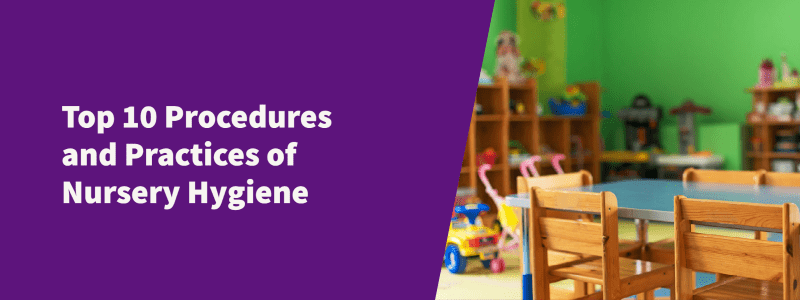Nurseries can be a hot bed of bugs and sickness. Children, as they should, muck about, play and man-handle anything and everything in their pursuit of making friends and acting their age. While this is all fun and games for the children, it leaves their minders and staff struggling to ensure they are keeping the kids (and themselves!) safe and healthy (or as healthy as possible). That’s why we have put together our guide to the top 10 procedures and practices of nursery hygiene.
Why is Hygiene Important in Education?
Hygiene is key in a nursery for the simple reason that it is important to keep the children safe and well. While the kids are in the care of a nursery, there is a duty from staff and the nursery to ensure their wellbeing. This is why hygiene in a nursery is important.
Call Today for an Instant Washroom Services Quote
Top 10 Procedures and Practices of Nursery Hygiene.
Here are our top ten nursery hygiene practices to keep your nursery safe and fresh for you and your staff.
- Ensure surfaces are clean. This is the basic stuff, but you need to make sure that at regular junctures in the day you are cleaning and disinfecting surfaces.
- The same with toys and books. Make sure you sanitise toys and books at the end of each day. Kids love to play, bite, and chew their toys, so cleaning these items is very important.
- Create good habits. This goes for both children but adults too. Teach good handwashing techniques, ensure everyone knows the cleaning rules and try and imprint good hygiene on children. This will create further good habits in the future.
- Make sure waste is kept away from kids. This is important because, as we all know, children will rummage through everything.
- Linked to the above – ensure your bins are disposed of properly! This goes for all types, be it food, clinical or general. Direct365 can help with that if you’re looking for a responsible company to service your waste!
- If someone falls ill, send them home! Adults have a habit of forcing themselves through sickness. But both adults and children should be sent home to reduce the chance of making others ill. This isn’t a COVID rule, it is a rule for life.
- When using cleaning solutions, make sure they’re stored away from children and visitors. Cleaning products, if handled incorrectly, could be very harmful. This, coupled with children not having the awareness of their actions, make cleaning products dangerous.
- Good food hygiene is important! Whether your nursery is preparing food, or simply providing somewhere for the children to eat their own, make sure you provide places to ensure good food hygiene.
- With food hygiene, comes avoiding pests. Wherever food is involved, there is the potential to attract pests. Storing and disposing of food correctly can help avoid this issue.
- Finally, proper ventilation is an important part of hygiene and illness prevention. During COVID, we’ve all heard of how ventilation can help reduce the spread of bugs, so why wouldn’t you keep on doing it?
You should always keep these practices in mind. While they are great for all settings, they are particularly helpful for nurseries. Do these and you can’t go far wrong.

